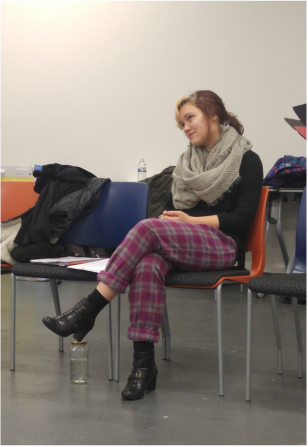 This week, current Paula Vogel Mentors Project fellow Helen Everbach is working with UArts student and PYP intern Shira Berger, to stage Helen's play Better Than Abnormal. They are also using this experience to create a How-To Guide for future students interested in mounting a production of their work. Read below as Helen talks about her process, her play's characters, and the underlying activism in her writing. About the Play Better Than Abnormal is a slice of life comedy about 32 year old Dani- messy, awkward, and the 'token straight friend' of her progressive predominantly queer friend group- and the people in her life. Her recently heartbroken brother is dangerously depressed, her best friend is often busy spending time with her crossdressing boyfriend, and Dani's lawyer colleges seem to be sexist and sleazy. Then she meets Allan- clever, musically talented, Scottish, but also kind of conservative. In a show that explores such themes as gender, sexuality, political differences, and normalcy, it begs the question: can we get past our differences, even when they divide us? BY: Helen Everbach Shira and I first worked together two years ago when she helped me develop my first play, “The Mundane Life of Joe Schwartz”, which I had written for a class at the end of eighth grade. The process of working with her was very important for me. She is a kind and talented director and I was (and am) so lucky to have had the chance to work with her. So when she contacted me about this opportunity to have “Better Than Abnormal” performed, I was overjoyed. 'I have always felt like it is really important as a writer, artist, and activist to include diverse and underrepresented characters in my work. It is such an important part of making social change. My father, who grew up in the 1960s and 1970s, always brings up Woody Allen, as problematic as he is. He really brought Jewish culture to the mainstream and for a lot of people he was the only Jewish character they knew and liked. It is critical for progress to be made that there can be positive and accurate depictions of groups of people who are underrepresented (and often oppressed) minorities. So when I became suddenly inspired one evening and launched headfirst into a flirty scene between two women discussing male partners, I knew there had to be a way to queer it. Coming personally from a queer background and having a predominantly LGBTQ+ friend group, it means a lot to me to show the culture of political awareness and queer activism from which I come to the world. I can’t think of a single show I know of (other than Doctor Who, my friends inform me) in which there are openly, explicitly pansexual characters. And that makes me sad. So let’s change it.
Flirty, smart, feminine, feminist, self-assured, kind of pushy and judgemental- Pat is how many of my friends see me, I think. She certainly is the most like me of all of the characters in this show. I would like to consider myself kinder and more considerate than (mostly) socially unaware Pat, but she is easy for me to write for and to understand. She naturally developed as the yin to Dani’s yang. Dani is interesting, and I think she is the part of us all when we’re tired, feel out of touch and lonesome, and just want to be snarky, lazy, and closed off to others. She is old fashioned in so many ways that fit with Allan. Think jazz music, Jane Austen, formal dinners, and swing dancing. And yet she’s so forward and clearly a part of her progressive friend group. She’s a vegetarian, she feels a responsibility to educate those around her and try to change the world, and she goes into a date having never met the man before with some expectation that they might have sex on the first date. Allan is the sweet, kind, ignorant straight white man we all know. It’s not that he doesn’t care about the world or politics, just that he’s never had any reason to confront his privilege- so he doesn’t really understand it. In the first drafts of “Better Than Abnormal”, he was much more of a hero. He didn’t as often mess up about things and seemed too conscious of how to ask personal questions with considerate delicacy. This meant that he only asked clarification questions about Edward’s clothing choices or Pat’s sexuality when he and Dani were alone, and listened kindly with no interruptions as Dani explained the gender spectrum in carefully worded paragraphs. You can see why this is bad for a play. By making Allan a little less well-versed in social justice, I added conflict to the story and removed a few large blocks of dialogue, but I also felt that Allan’s character rang true a little more and I could see in him more of those men in my life who are similarly out of touch. Edward was a character I’d had in my mind for a long time. I went with a school trip to New York and we saw Kinky Boots. It made a big impression on me. I was really excited by the fact that Lola wasn’t gay. This so well explains to straight audiences the separateness of gender and sexual orientation. Thus I was shocked when, weeks later, I was discussing drag performance with the girl sitting next to me in chorus. I knew of her straight identity and asked if she would ever date a drag queen. Her answer was that no drag queen would ever be attracted to her because she is a woman. She had seen Kinky Boots, so I mentioned the character of Lola and asserted that there very clearly are straight drag queens. She straight up refused to believe me, and that got me thinking: how many people associate male femininity exclusively with homosexuality? Edward is very distinctly not a drag queen, and should never be viewed as such, but there are a lot of men who long for femininity and dress in women’s clothes only in the privacy of their own home for fear of social judgement. Look online at forums discussing this and it really shows how many people there are in this position. It is clear to me that Edward needs to be seen and that people need to know it’s okay to be feminine as a man. And it doesn’t mean no one will love you. Travis is really important to sort of show how Dani’s views developed. Clearly the two are very close, and he has had a huge effect on her as an adult. At the time I wrote this, I was in a group with two boys my age who both expressed homophobic views that gay relationships never end up well and gay people can never really be happy long-term. It came as a huge surprise to me when I discovered that they, in fact, had two dads. The dads were in the process of getting a divorce and I could see the reactionary quality of these views. I wanted to include that in my play, as is referenced. I also wanted to explore how mental disorder can affect relationships. I am pleased with how Travis developed. Colin was important to me because I wanted to plot with the daughter’s homophobia, but also because throughout this play there is a theme of hope that different doesn’t mean you can’t be happy and it felt wrong to leave Travis alone. I think for every playwright it is such a dream to have the show of your brain become a reality in a room. Seeing people become my characters and understand my script- really struggle to make it into something meaningful- is glorious. I also just really enjoy seeing the process of the show come together. I personally am an actress, and it’s really cool to see the production from the opposite side. After the initial correspondence regarding Shira’s producing “Better Than Abnormal”, I worked on editing the script. It became a lot tighter and I removed a lot of (though clearly not all) extraneous language and banter. I cut down the script 17 pages, which really forced me to figure out what really did or did not need to be said. Shira and I called on the phone the weekend before rehearsals began to discuss what we each wanted to happen and what it would look like, and then the first rehearsal began! Our first rehearsal was really exciting because I’d never heard any of it read aloud before by anyone other than me. The actors are great and it is super cool to see it all come together as a fully formed play. Shira is so delightfully enthusiastic about this play, and it makes me really happy. We both feel that this is important in a real way. This is activism and this is seeking change. Hopefully the people who need to understand these things will see the play, or somehow it will reach them, because there is still so much work to be done. The world can really get me down sometimes when I think about sexual politics and straight up ignorance, and that’s why I feel these kinds of things are so important, and this show is hopeful- we can teach and we can learn, be patient with one another, and find what’s really important. Because we’re all just people. Really. We are.
0 Comments
Leave a Reply. |
Categories
All
|
|
This work is licensed under a Creative Commons Attribution-NonCommercial-ShareAlike 2.0 Generic License.
|
|
© Philadelphia Young Playwrights - 1219 Vine Street, Floor 2 Philadelphia, PA 19107
Phone: 215-665-9226 Fax: 215-665-9228 Email: [email protected] |


